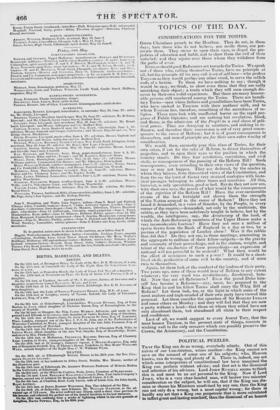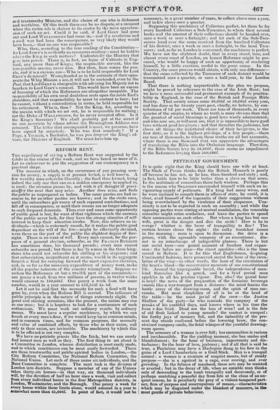POLITICAL PUZZLES. POLITICAL PUZZLES.
THAT the King can do no wrong, everybody admits. Out of this axiom of our Constitution, arises another—the King cannot act save on the counsel of some one of his subjects; who, Heaven knows, can do wrong, and plenty of it. There is, indeed, one act which some interpreters of constitutional law have imagined the King cars perform without advice; and that act is the dismissal and selection of his advisers. Lord JOHN RUSSELL seems to think this is and must be an act personal to the King. Now if Lord JOHN, who is a very clear-headed man, will bestow two minutes consideration on the subject, he will see, that if the King can dis- miss or choose his Ministers unadvised by any one, then the King can not only do a wrong, but a most capital wrong; for there is hardly any act that a King can perpetrate that is more calculated to inflict great and lasting mischief, than the dismissal of an honest atd trustworthy Minister, and the choice of one who is dishonest and worthless. Of this truth there can be no dispute, at a moment when the entire isle is shaken to its centre by the mere apprehen- sion of such an act. Could it be said, if Lord GREY had gone out and Lord WELLINGTON had come in,—and if a revolution and a civil war had been the consequence, as very likely they would have been,—that no one was responsible? Who, then, according to the true reading of the Constitution— for Loi d J oiler's is evidently an erroneous reading—must be held to advise the King in such matters? Undoubtedly the Ministry that gees into power. There is,• in fact, no lapse of Cabinets in Eng- land, any more than of Kings; the responsible servant, like the irresponsible master, never dies. But then, here comes the puz- zle, and it is a curious one—Who is to be held responsible for Lord GREY'S dismissal? Wrongheaded as in the estimate of their oppo- nents the Whig Ministe. s are, it will not be contended, even by the Post, that Lord GREY is chargeable with advising his Majesty not to hearken to Lord GREY'S counsel. This would have been an excess of finessing of which the Reformers are altogether incapable. The responsibility of his own meal doubtless rests upon the noble Earl's shoulders, and that responsibility he must be content to bear; but he cannot, without a contradiction in terms, be held responsible for his retirement. Who is, then ? Not the King, for, according to the maxim with which we set out, he is responsible for nothing ; not the Duke of WELLINGTON, for he never accepted office. is it the King's Secretary ? We shall probably get at the secret if we can ascertain by whose advice the Birmingham Address was returned. The letter that accompanied it must, we presume, have been signed by somebody. Who was that somebody ? If a Page, a Yeoman, a Beefeater, he was pro tempore the King's ad- viser, the Minister of England. We must have him up.



























 Previous page
Previous page